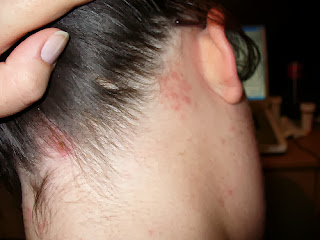 |
| Scalp Conditions |
An important part of skin care that most people do not even realize, is caring for your scalp. As a daily activity, washing your hair can of course become a monotonous and annoying chore, but can prevent a fungal scalp infection from occurring. Although this condition is seen primarily in children, it can be seen in adults with no symptoms. The most common way of acquiring the scalp fungus is from another individual, which can lead to damaging the hair follicles and causing patches of hair to fall out. A scalp infection can be painfully embarrassing and those aware of its symptoms need to take the proper precautions in order to prevent it from ever happening.
The fungus scalp infection is primarily seen in young children, 5 to 6 years old. The infection is seen in boys more than girls and can be transmitted to children at playgrounds and day cares. The fungus can be seen on hair brushes, pillow towels, combs and clothes. The scalp fungus can even survive for a long period of time, not allowing for the proper care and treatment.
The fungus scalp infection is commonly known as Tienea Capitis and may appear in several different ways. Those include; matter hair with crusts, smooth spots of hair loss, itching, pain, dry scalp, excessive dandruff, redden areas of hair loss with pus, mild scaling on the edges of the scalp, and patchy spots of hair loss.
It is important if you notice any type of scalp infection, to treat it immediately or you may sustain any number of the fore mentioned side effects. When the scalp infection is not recognized for a long period of time and treatment has not been administered, the fungus infection will cause pus pockets on the scalp, and leads to enlarged lymph nodes at the back of the neck and behind he ears. If the fungus infection is not treated within a reasonable time frame, the scalp can suffer permanent hair loss and scarring.
In order to treat Tine Capitals, anti fungal medications, taken by the mouth, should be used to treat the infection. Keeping the area clean, use a medicated shampoo should reduce the spread of infection. Other family members and pets should be examined and treated if necessary. This type of scalp infection may be extremely persistent, may resolve spontaneously at puberty, and may recur. In order to successfully prevent any sort of infection, overall good hygiene is naturally recommended. The scalp should always be shampooed regularly, especially after haircuts. As a general rule, you should always avoid contact with infected pets or individuals. Do not exchange headgear, combs or similar items until they have been properly cleansed and dried.
If you have children, encourage them to continuously wash their hair and treat their scalp accordingly as to prevent any infections. They should also be aware of the dangers of sharing combs, brushes, hats or hair accessories with friends. Please see your child's doctor if he or she has hair loss or itchy, scaly spots on the scalp. If you are at all suspicious about an area on your child's scalp, take them in to see a doctor for an examination.
Published At: www.Isnare.com
Related Topics :
Falling Hair? Cure It With Simple Scalp ExerciseEczema On The Scalp
Use a Hair Brush Every Day to Improve Scalp Circulation to Make Your Child's Hair Strong and Healthy
The Basic of Hair and Scalp Conditioning
Male Hair Loss : Natural Hair Loss Treatment